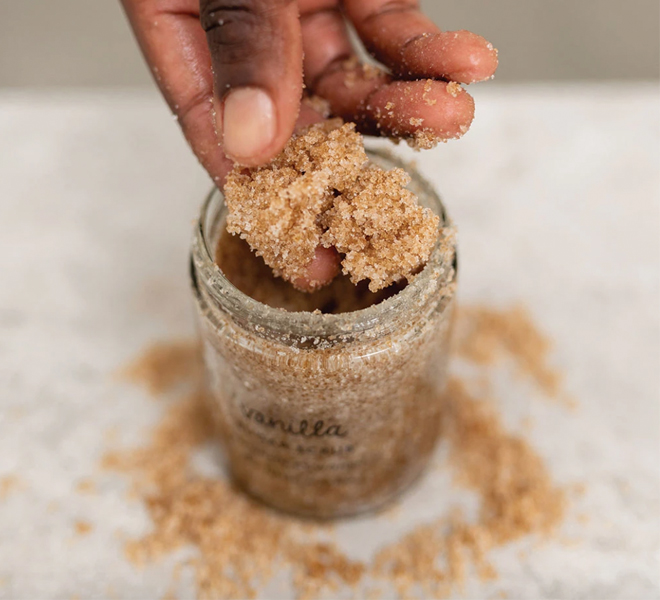Should I Use a Physical or Chemical Exfoliator?

This week in skincare, we’re answering a very important question: should you use a chemical or physical exfoliator? Physical exfoliators are the ones most of us are familiar with, however, chemical exfoliators, though they sound intimidating, have become a popular skincare staple too. If you’re looking for a new product but aren’t sure where to start, then you’ve come to the right place, because we’ve got all the details on which products may be best for you. Ready? Keep reading for the scoop on chemical and physical exfoliators…
What Is A Physical Exfoliator?
A physical exfoliator is something you’ve seen before, usually in the form of a scrub or manual exfoliation with brushes and sponges. A lot of these facial scrubs have exfoliating particles like finely grounded powders or grains from a variety of sources. For manual exfoliators, think Clarisonic brushes or Konjac sponges. These are all created with the purpose of helping you slough off surface-level dead skin cells.
What Types Of Physical Exfoliants Are Out There?
Not all physical exfoliants and products are created equal, so it’s important to know the different types to see which method can be most beneficial to you. Including what we’ve mentioned above, here are some general types of physical exfoliators out there:
- Exfoliating Scrubs
- Exfoliating Powders
- Brushes
- Sponges
- Microdermabrasion wands
The most important part of physical exfoliating, if you’re not sure where to start, is that you’re using a product or method that is gentle on your skin. Many people assume that to rid your skin of dead skin cells, you need to scrub or brush your skin harshly, when in fact, you only need gentle exfoliation a couple of times a week to see results. We’d recommend that you start with a gentle scrub or powder that doesn’t include large grainy particles that can potentially lead to micro-tears.
Shop Physical Exfoliators…
What Is A Chemical Exfoliator?
A chemical exfoliator is different in that you are using chemicals to help exfoliate dead skin cells. It helps to break up the bonds between your cells, making it easier to loosen and rid your skin of dead skin, per Byrdie.com. Aside from exfoliating away dead skin and impurities, they can also help you achieve bright, glowing skin. With chemical exfoliators, you’ve probably seen intimidating terms and acronyms like AHAs, BHAs, salicylic acid, and glycolic acid. What can make it even more confusing is that you might see these chemical exfoliants included in multiple items, like masks, cleaners, toners, peels, and gels. Don’t worry—if you feel like there are question marks hanging above your head, know that you’re not alone. We’ll explain what they all mean shortly.
What Types of Chemical Exfoliants Are Out There?
As we mentioned above, here’s a quick lowdown on these common chemical exfoliator ingredients:
AHAs
AHAs, or Alpha Hydroxy Acids, are chemical exfoliating agents that can be derived from natural substances like milk or sugar. AHAs are a lighter option as they help to exfoliate only the surface of the skin. Glycolic acid and lactic acid are examples of common AHAs, according to KateSomerville.com.
Shop AHA Exfoliators…
BHAs
BHAs, or Beta Hydroxy Acids, differ from AHAs in that they can penetrate into your pores and hair follicles for a deeper exfoliation. This means they are able to remove even more lingering impurities in your skin. Salicylic acid is the most common BHA, per KateSomerville.com. BHAs are a great option for those with acne-prone skin because it helps to also remove sebum that’s clogging your pores, according to Dr. Dennis Gross on The Daily Dose.
Shop BHA Exfoliators…
Enzymes
Enzymes exfoliate your skin by digesting your dead skin cells chemically. They decompose and break up those dead surface cell proteins, making it easier to remove. Enzymes work at a slower rate than acids, so it’s a very gentle exfoliating process for your skin, says KateSomerville.com.
Shop Enzyme Exfoliators…
Can I Use AHA And BHA Acids On My Skin?
Yes, but only if they are formulated together in one product. We wouldn’t recommend using two acids from separate products together, because that could potentially lead to skin irritation and inflammation.
Shop AHA-BHA Exfoliators…
Do I Need To Use Multiple Products With Chemical Exfoliants?
You can, but it’s not necessary. While there are tons of options available on the market—masks, toners, wipes, washes, you name it—one product that includes any acids we mentioned above should do the trick, per Healthline.
So, Which Exfoliator Should I Use?
Well, it depends on what your skin needs are. There isn’t a one-size-fits-all answer here because our individual skin types are so different and varied. It’s a matter of preference, need, and direction from your dermatologist. If you’re looking for simple exfoliation and don’t feel the need to try a chemical exfoliator, then a physical exfoliator may be best for you. We caution you to make sure the product you’re using is as gentle on your skin as possible.
However, if you’re looking for more ‘oomph’ in your treatments, try using a chemical exfoliator a couple of times a week. The few acids we mentioned are some of the most common we’ve seen, so depending on your skin needs, you may need a product that includes only one, or even both.
What exfoliating products do you currently use?
We hope this article has been helpful for you in your exfoliation journey and that you’re able to find a product that works well for your skin type. Let us know which exfoliators you are currently using or want to try in the comments below.
XO Team LC
Photos: The Little Market
Sources:
Everything You Need To Know About Chemical Exfoliation, Healthline (2020)
Physical or Chemical: What Kind of Exfoliator is Best?, Byrdie (2020)
Experimenting With Exfoliation: Tips From An Esthetician, Kate Somerville (2019)
Skin Solutions: What Is Exfoliation, How To Exfoliate, Benefits & Chemical Vs Physical Exfoliation, The Daily Dose (2020)
Affiliate links may have been used in this post.

